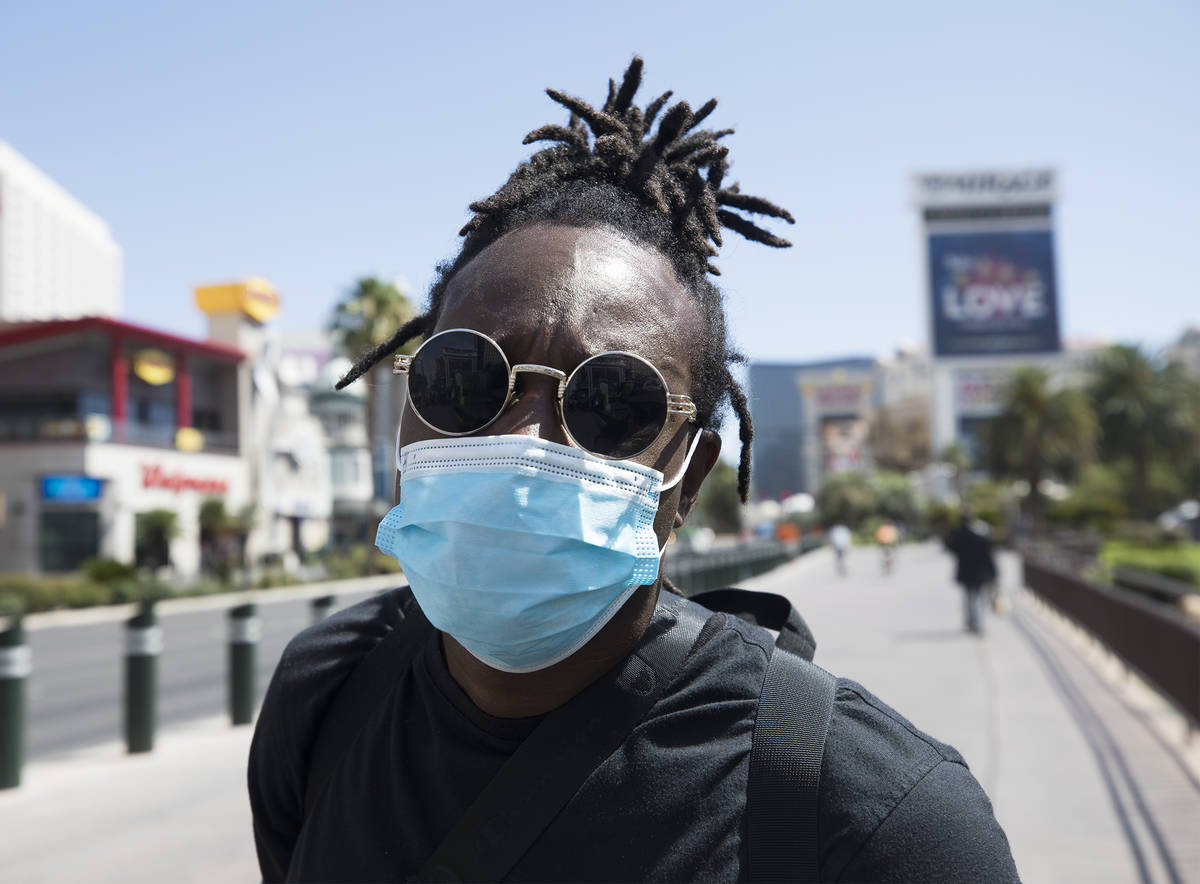Do’s and don’ts of wearing face masks in Nevada
CARSON CITY — Starting Friday, wearing face masks in Nevada will be mandatory in nearly all public spaces as the state seeks to slow, then reverse a resurging spread of COVID-19 infection without backtracking on the reopening of businesses and the return of other daily routines.
Gov. Steve Sisolak’s order on masks comes after months of admonition by the governor and health officials aimed at getting people to wear them voluntarily. The requirement is enforceable by local authorities, but the governor has said he wants to encourage compliance rather than punish failure to comply.
Here’s a summary of the rules, along with exemptions and answers to other questions. This information is drawn from the the state’s COVID-19 response website.
When and where are face coverings required?
Per the state’s guidance, be prepared to wear one everywhere outside the home. Face coverings should be worn at all times in the following circumstances:
PUBLIC SPACES
■ Inside of, or waiting to enter, any indoor public space.
■ Outdoors in a public space when 6 feet of social distancing with people outside your immediate household isn’t possible.
TRANSPORTATION
■ On public or private transportation or paratransit used by others, or while waiting for a ride.
■ In taxis, private car services, monorails, trams, and rideshares such as Uber and Lyft.
■ Operating any form of transportation or paratransit when passengers are people outside your immediate household.
AT WORK
■ When interacting face to face with members of the public.
■ In any space visited by the general public, even if no one else is present.
■ In any space where food is prepared or packaged for sale or distribution.
■ When walking though common areas including hallways, stairways, elevators and parking facilities.
■ In any room or enclosed area where other people outside the family home are present, when unable to physically distance.
AT THE GYM, FITNESS CENTER, DANCE STUDIO OR SIMILAR
■ When interacting with other people.
■ When entering and exiting and in common areas.
■ When physical distancing is difficult and the type and intensity of the exercise allows for wearing a face covering.
■ When doing low-intensity activities, e.g., walking on an indoor track, stretching, low-intensity yoga, Pilates, or similar exercises.
■ When possible, consider doing vigorous-intensity exercise outdoors and with at least 6 feet of distance from other people who don’t live with you.
What about children?
Children 2 or younger should never wear a face covering due to the risk of suffocation. Children ages 2 to 9 are encouraged but not required to wear face coverings in public. Children 10 and older are required to follow the same rules as adults.
For children in child care, providers must comply with state and county health requirements and communicate requirements to parents and guardians. The same applies in public or charter schools operating summer school and day camps, in line with local and state requirements.
What are other exemptions?
■ People with a medical condition — be it mental health, disability, or other reason — that prevents them from wearing a face covering, including people with any medical condition for whom wearing a face covering obstructs breathing or who are unconscious, incapacitated, or otherwise unable to remove a face covering without assistance.
■ Homeless people. They are encouraged to practice social distancing, wear face coverings if possible, and seek out available community services.
■ The hearing impaired or when in communication with someone who is hearing impaired, where the ability to see the mouth is essential for communication.
■ Anyone for whom a face covering “would create a risk to the person as related to their work, as determined by local, state or federal regulators or workplace safety guidelines.” This is meant to apply to law enforcement officers, among others.
■ People obtaining services involving the nose or face for which temporary removal of the face covering is necessary to perform the service.
■ Those seated in a restaurant or other food or beverage establishments while they are actively eating or drinking, provided they maintain a 6-foot distance from persons they don’t live with.
■ People engaged in outdoor work or recreation, such as swimming, walking, hiking, bicycling, or running, when alone or with household members, and when they are able to maintain a distance of at least 6 feet from others.
■ Incarcerated people. Jails and prisons are working to mitigate contagion and have specific guidance for face coverings that applies to both inmates and staff.
■ Those with a medical condition or disability or who can’t remove a mask without assistance. Such individuals should choose a non-restrictive alternative, such as a face shield, if possible.
What does this mean for businesses?
Businesses must adhere to a “no mask, no service” policy, posting notices on doors and out front to promote awareness and publicize requirements for entry and safety. Businesses must thoroughly screen anyone who is exempted from the face covering directive.
Can businesses turn away customers who refuse to wear a mask?
Businesses have the right to refuse service and ask a patron to return at a different time with a face covering. Businesses should check if someone without a face covering belongs to an exempted group. If not, businesses are “encouraged to use the opportunity to have a discussion with any noncompliant individual and educate them on the importance of wearing a face covering to protect themselves, other patrons, and staff,” according to state guidance.
The guidance continues: “If a confrontation occurs between a patron refusing to wear a face covering and an employee, please use discretion and alert local law enforcement as necessary.”
Contact Capital Bureau reporter Bill Dentzer at bdentzer@reviewjournal.com. Follow @DentzerNews on Twitter.











































